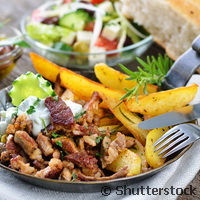A recipe for protecting Europe's culinary heritage
Want to find the recipe for, say, a traditional Greek dish, complete with information on the meal's nutritional value? Now you can, thanks to the EU-funded project EuroFIR ('European food information resource network'). This initiative has established an authoritative food composition data source to provide standardised information from and for dieticians, researchers, students, industry and regulators. A non-profit organisation, EuroFIR AISBL, was also set up to continue developing the project's database and disseminating food composition information to SMEs, healthcare professionals and researchers, following completion of EuroFIR NEXUS, a coordinated support action (CSA), in 2013. The original Network of Excellence, involving 110 researchers and 50 postgraduate students from 21 European countries, set out to develop and put into practice reliable and accessible food information resources. This was seen as crucial to providing necessary support and tools for advancing food and health research in Europe. EuroFIR included traditional and ethnic foods, and in particular on the preparation of dishes closely linked to a country or region. People have often passed on recipes and methods from generation to generation by word of mouth, effectively turning these foods into a facet of cultural identity. Throughout Europe, however, many traditional foods and ways of cooking are at risk of disappearing, due partly to changing lifestyles and habits. It is, therefore, important that traditional foods are documented, because they represent a direct link to our cultural heritage. A working group was established within EuroFIR to gather information on traditional dishes from 13 European countries (Austria, Belgium, Bulgaria, Denmark, Germany, Greece, Iceland, Italy, Lithuania, Poland, Portugal, Spain and Turkey). All the countries are featured in the final project report, which also included information on the culinary history of the nations featured. Another major objective of the project was to examine whether traditional foods are healthier than modern foods. The researchers found that traditional foods, generally, use local products, but are not always healthier - their impact on our diet still depends on their nutritional composition. The recipes for over 60 dishes were documented during the project and provided on bilingual cards, in English and in the language of the country of origin. Also included is information on protein, energy, fat, carbohydrates, sugar, sodium and dietary fibre, to give people an idea of how much the meal they are preparing will contribute to their daily energy and nutrient intake. In addition to the online resource, the project team also established the EuroFIR Association, based in Brussels, with 42 of the original partners joining as members. The main aim of EuroFIR AISBL is to continue to support and promote the development, management, publication and application of food composition data, through international cooperation and harmonisation. EuroFIR received around EUR 12 million in EU funding and ended in June 2010.For more information, please visit: EUROFIR http://www.eurofir.org/ Project factsheet
Countries
Belgium



